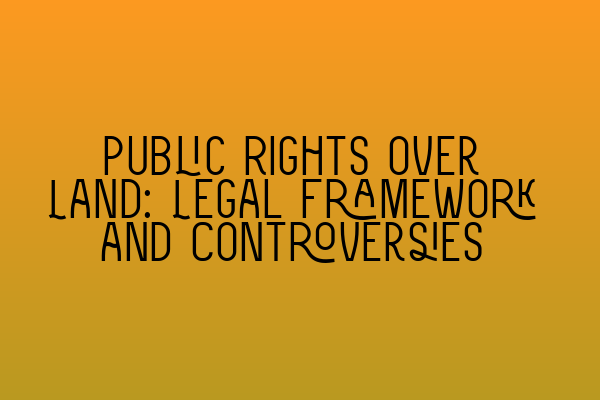Public Rights over Land: Legal Framework and Controversies
Welcome to the blog of SQE Property Law & Land Law, where we provide insights into various aspects of property law. In this post, we will explore the topic of public rights over land, examining the legal framework and controversies surrounding this issue.
The Legal Framework of Public Rights over Land
Public rights over land are legal rights that allow members of the public to access and use certain areas of land. These rights are often associated with public spaces, such as parks, beaches, and footpaths. The legal framework governing public rights over land can vary depending on the jurisdiction, but there are some common principles.
In many countries, public rights over land are based on common law principles, statutory law, and regulations. These rights are often established through legal mechanisms such as easements, dedications, and public access agreements. The purpose of these mechanisms is to ensure that members of the public can enjoy and benefit from certain areas of land.
One of the key legal considerations when it comes to public rights over land is the distinction between public and private land. Public land is owned by the state or government entities and is intended for public use. Private land, on the other hand, is owned by individuals or private entities and is subject to the rights and restrictions associated with private property ownership.
It is important to note that public rights over land are not absolute and can be subject to limitations and regulations. For example, certain restrictions may apply in the form of permits, time limitations, or specific usage rules. These limitations are often put in place to balance the rights of the public with the rights of private landowners and to ensure the proper management and preservation of public spaces.
Controversies Surrounding Public Rights over Land
Public rights over land can be a contentious issue, sparking debates and legal disputes. Some of the controversies surrounding this topic include:
- Encroachment: One of the main controversies is the encroachment of private property rights by public rights over land. In some cases, landowners may claim that public use of their property infringes on their rights to exclusive possession and enjoyment. These disputes often involve arguments over the scope and extent of public rights and the impact on private property rights.
- Development and Restriction: Another controversy arises when public rights over land come into conflict with development plans and restrictions. The balancing act between preserving public access and allowing development is a complex issue that requires careful consideration of various legal and policy factors.
- Environmental Conservation: The protection and preservation of public spaces, especially those with environmental significance, can be a contentious issue. Balancing public access with the need to safeguard fragile ecosystems and biodiversity is often a subject of debate.
Conclusion
Public rights over land are an important aspect of property law, ensuring that members of the public have access to certain areas of land for recreational, cultural, and other purposes. However, these rights are not without controversy, and their application and extent can give rise to legal disputes.
In this blog post, we have explored the legal framework of public rights over land and highlighted some of the controversies that surround this topic. To learn more about related topics, take a look at the following articles:
- Misrepresentation in Contracts: Unveiling Deceptive Practices
- A Closer Look at SQE Contract Law Syllabus
- SQE Contract Law: Analyzing Landmark Cases and Influential Judicial Decisions
- Contract Law for Services: Key Considerations and Best Practices
- Understanding Contractual Capacity: Rights and Limitations
Stay tuned to our blog for more insightful articles on property law and land law!
